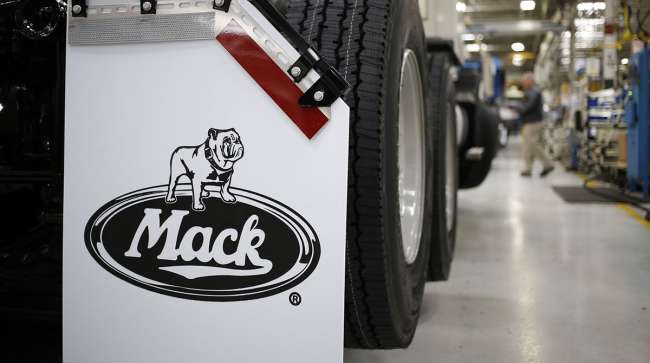Senior Reporter
Class 8 Orders Up 75% Year-Over-Year to 37,500

North American Class 8 orders in December accelerated 75% year-over-year to roll past 37,000 units and continued to prime already strong production levels, ACT Research Co. reported.
Preliminary net orders were 37,500 compared with 21,386 a year earlier. ACT will revise the totals once the truck makers report final numbers.
December’s volume was the highest since December 2014, when orders reached 44,037.
Orders were slightly higher than ACT expected, but that won’t change its 2018 North American production forecast of 322,000 units, ACT Vice President Steve Tam told Transport Topics.

Tam
“We are probably one of the more bullish forecasts in the market place for 2018,” he said. “Our expectation is that [truck makers] will be increasing build rates in order to meet customer delivery targets.”
As 2018 begins, freight growth remains strong and capacity is tightening. “We see that week in and week out,” Tam said.
Order expectations had been in the 35,000-to-36,000 range, according to Credit Suisse analyst Jamie Cook.
“While it’s unlikely that tax reform had any direct impacts on the order number, we suspect a marginal indirect impact from the broader positive effect in the manufacturing sector, which has created an anticipation for incremental freight demand. The potential for an infrastructure bill could also have helped in terms of sentiment,” Cook wrote in a note to investors.
Research company FTR pegged preliminary orders at 37,200.

Starks
“Right now, what we are seeing is there is nobody who is weak, but there are a couple [of truck makers] that are stronger than the rest,” FTR Chief Operating Officer Jonathan Starks told TT.
Truck makers are running at a level where they could readily hit 300,000 units in 2018 — more than 300,000, something always emerges as a limiter and truck makers begin to lose efficiency, he said. Those factors include labor, manufacturing capacity or shortages of some particular component.
“The market typically maxes out at 330,000 or so,” he said.
Analyst Michael Baudendistel, with Stifel, Nicolaus & Co., also forecast production in 2018 should be up significantly from 2017 levels.
Baudendistel put his production forecast at 305,000 units, up 19% year-over-year, he wrote in a note to investors.
One dealership executive said trading cycles had calmed down.

“We saw a pretty big uptick in November and into December. I would say that was due to the production slots filling up with two of our major truck makers, Mack and Volvo,” said Robert Gomez, executive vice president of sales for Worldwide Equipment Inc.
The Prestonsburg, Ky.-based company is a truck and trailer dealer representing brands that include Mack Trucks, Volvo Trucks North America, Kenworth Truck Co., International Truck, Hino Trucks and Isuzu. The company operates in six states and has 16 full-service dealerships and 15 leasing locations, among other facilities.
Mack and Volvo are units of AB Volvo.
With its Kenworth products, there is a four- to six-week lead time, he said.
“Our stock orders ramped up in December, but not necessarily customer orders for our Kenworth product,” he said. Worlwide’s website shows a variety of new vocational and straight truck models from Kenworth for sale.
Kenworth is a brand of Paccar Inc.
Meanwhile, the loudest recent buzz over orders for heavy-duty trucks was generated by the handful of large logistics companies, for-hire and private fleets placing “reservations” for Tesla’s electric Class 8, set to begin production in late 2019.
“To me, it reminds me of the automotive hybrid craze,” Gomez said. “I’m not saying there won’t be a market for an electric truck, and I am sure they will gain some market share from other Class 8 OEMs. My question would be, ‘How do they support the product without a dealer network across the country?’ ”
At the same time, Toyota is testing a Class 8 hydrogen electric truck in a drayage operation in Southern California and reported it would have further announcements this year.
“My only comment [on Tesla’s truck] would be that we welcome all efforts to reduce emissions and are happy that other manufacturers are supporting the push toward zero-emission vehicles,” said Craig Scott, director of advanced technology vehicles for Toyota Motor North America.
Electrification of Class 8 trucks certainly has the potential to be disruptive for the market, Tam said.
“But in the great, grand scheme of things, it is not going to change overall demand,” he said. “It would simply alter the composition of the vehicles that comprise that demand.”


